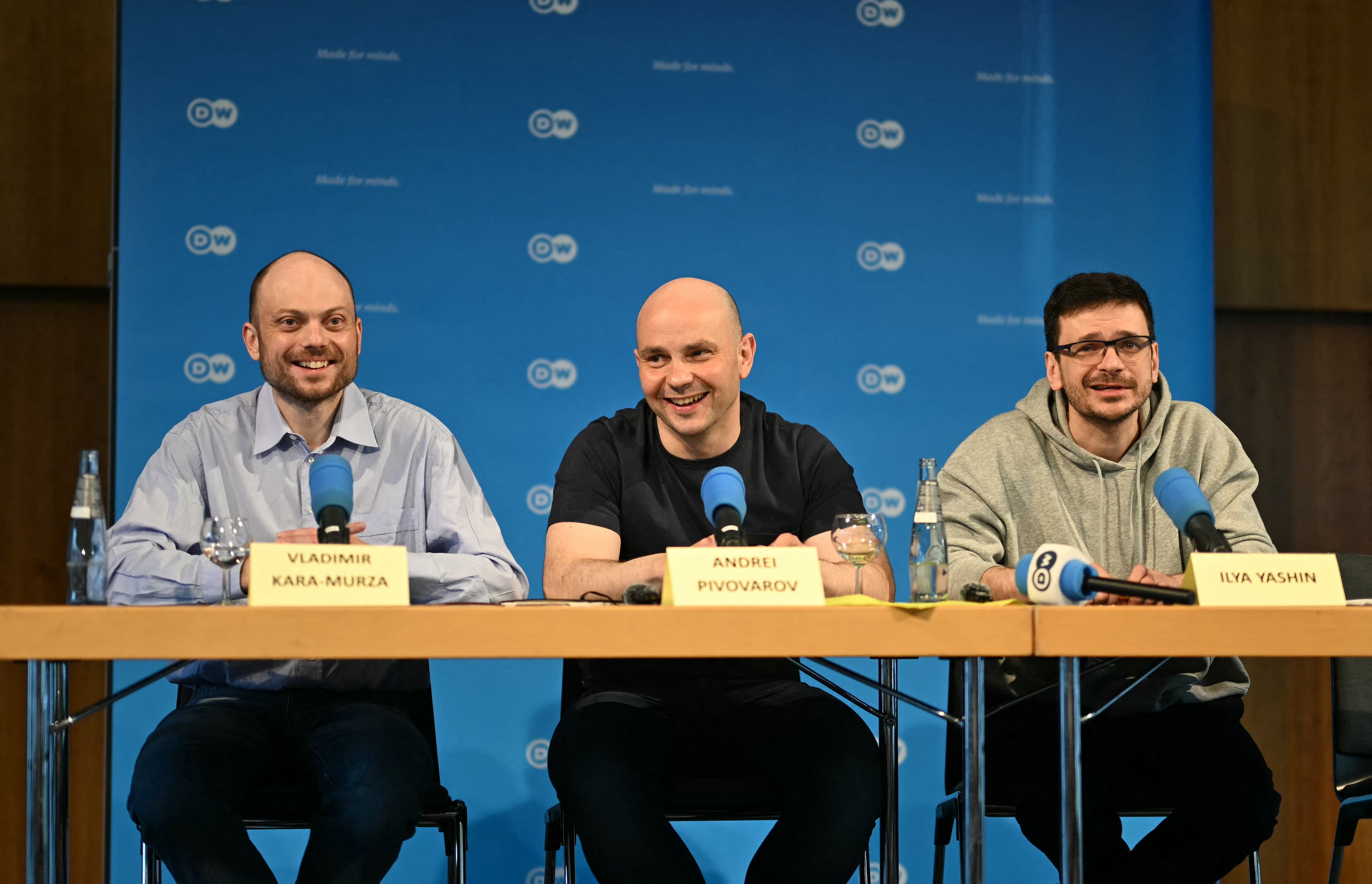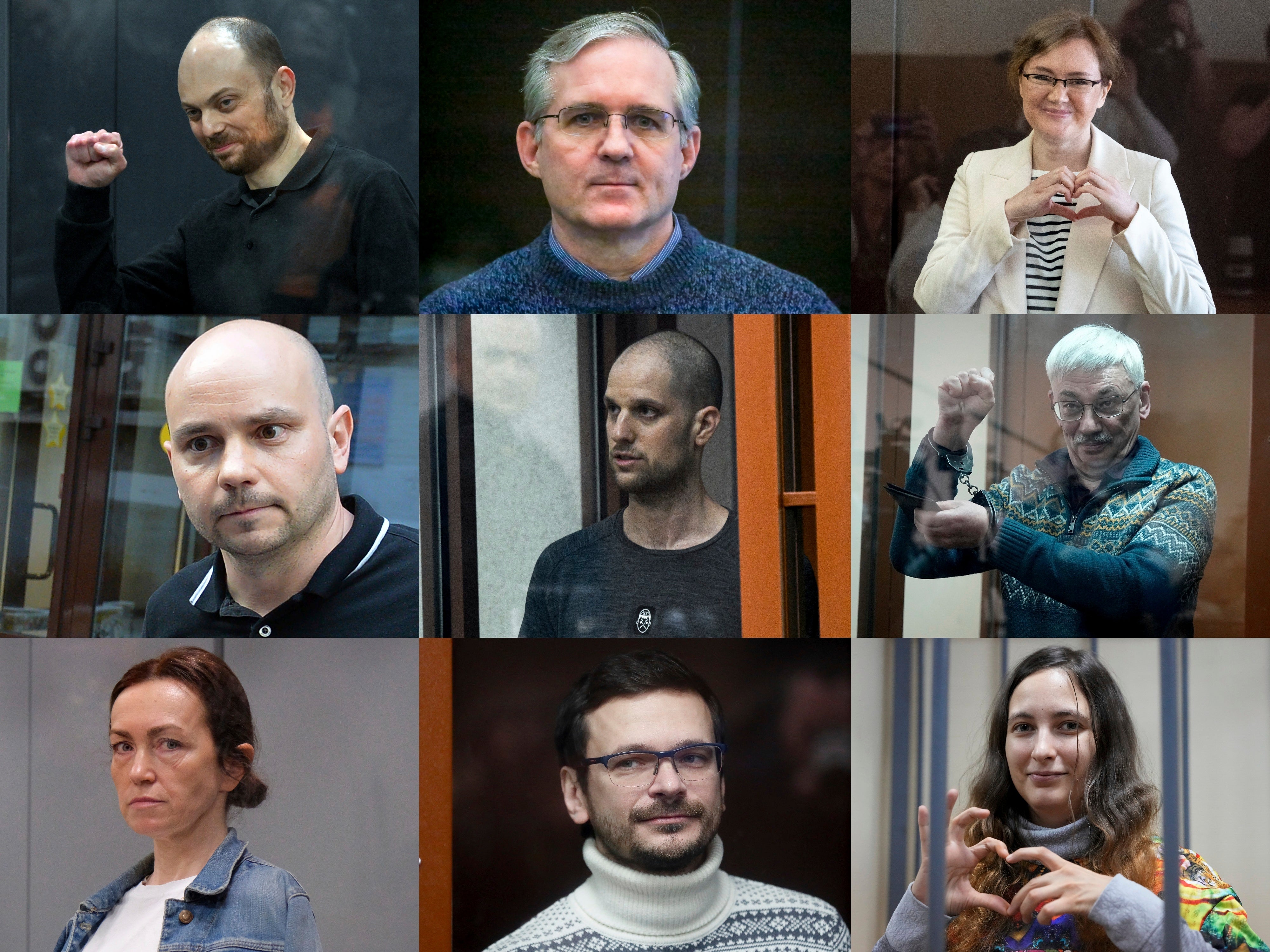British-Russian dissident Vladimir Kara-Murza has pledged he will return to Moscow “sooner than you think” despite his ordeal as a political prisoner under Vladimir Putin’s regime.
The Cambridge-educated political leader, who spent much of his teenage years living in London, was one of 16 prisoners swapped for eight detainees held in the West on Thursday in the largest such exchange since the Cold War
Also involved were three US citizens, including journalist Evan Gershkovich, three Germans and nine Russians. In return, Moscow received eight Russians accused of murder, spying and money laundering.
At a news conference in Bonn on Friday evening, Kara-Murza sat alongside former captives Ilya Yashin and Andrei Pivovarov, both of whom are figureheads of the Putin opposition, and recounted the moment their plane left Moscow for Ankara, Turkey.
“Each of us was accompanied by our personal FSB [Russian security service] officer … who was sitting next to us on the plane,” Kara-Murza said. “My FSB officer … told me the moment that our plane was taking off: ‘Look out the window. This is the last time you will see your motherland.’
“I turned to this guy and I laughed. I told him: ‘Look man, I am a historian by education. I don’t only feel, I don’t only believe, I know I will be back in my home country. And it will be much quicker than you think.’”
All three men were smiling as they faced reporters immediately after leaving a medical facility. It was, Kara-Murza said, their “first venture into the outside world” since being detained.

The British passport holder was dressed in a light-blue baggy shirt that hung off him, a sign of the horrendous mistreatment he and so many others suffered while in detention.
Kara-Murza was arrested in April 2022 for speaking out against the war in Ukraine, charged a year later then kept in solitary confinement, in a Siberian penal colony more than 9,000km, or 5,500 miles, from his family in the US state of Virginia, for a year until his eventual exchange.
His wife Evgenia, mother Elena Gordon and lawyers had repeatedly told The Independent that time was running out for him in prison because he suffers from a debilitating nerve condition that requires constant treatment.
Upon his release, Kara-Murza revealed he had felt the same fear. In a clip of his phone call with Evgenia and two of their children in the Oval Office on Thursday, while US president Joe Biden watched on, he could be heard saying: “I was sure I was going to die in prison. I can’t believe what’s happening. I still think I am sleeping in my prison cell.”
In the week running up to his release, he described how he was taken into a room by two FSB officers, sat down beneath a portrait of Putin and asked to sign a letter to the Russian leader admitting guilt and showing “remorse”.
Kara-Murza said he laughed before refusing to sign the letter, telling the two officers that he considered Putin not only an illegitimate leader of Russia but also “a dictator, a usurper and a murderer”. After five unsuccessful attempts to make Kara-Murza sign the piece of paper, the two officers gave up and escorted the dissident back to his cell.

Two days later, he was taken back to that same room by the same two officers. He was told that his original comments on 23 July had been recorded on video camera and that they required Kara-Murza to write an official explanation for why he said what he did.
“I said, ‘give me the pen, this time I will write’,” the opposition figure recounted.
He then proceeded to repeat his original comments about Putin, before adding that he believed the Russian leader was “personally responsible” for the death of Boris Nemtsov, Alexei Navalny and “thousands of civilians, including children, in Ukraine”. He was then taken back to his room.
Two days later again, he was woken up at 3am, told he had 20 minutes to pack up his belongings, then taken on the eventual route to Turkey for the exchange.
But while the joy he felt to be free to see his family again was clear, Kara-Murza was at pains to express that the Putin regime had no right to expel him from his country. Nor, he added, did they ever have a legitimate reason for arresting him.
His remarks followed an emotional message in Russian from Yashin, who appeared furious that he had been removed from his country and said he had been taken against his will.
According to the Russian constitution, Kara-Murza said, it is “expressly forbidden” to expel Russian citizens from Russia without their consent.

